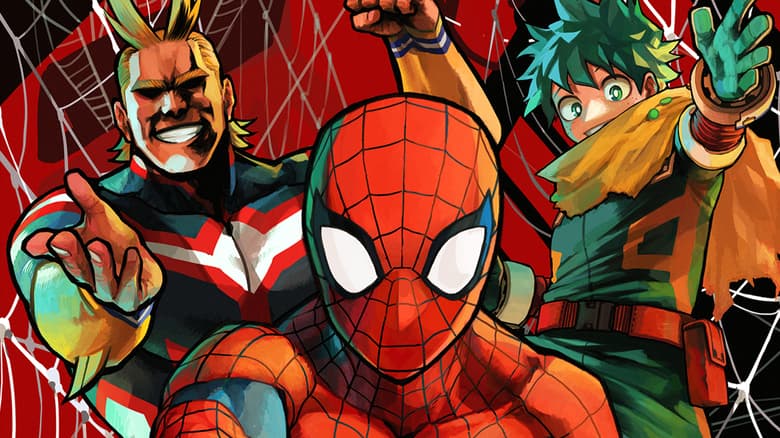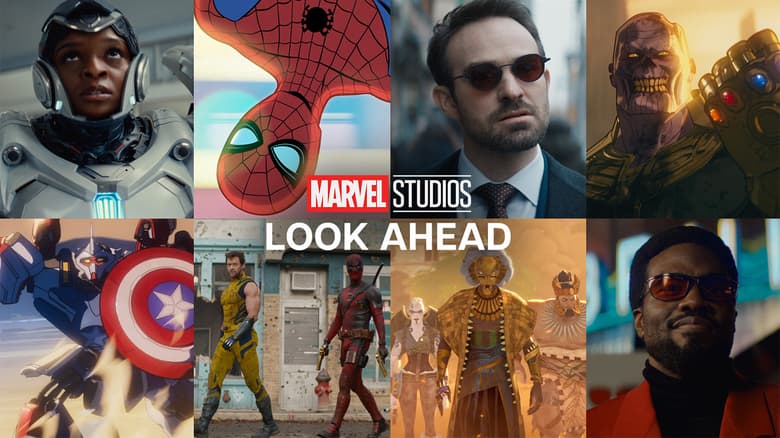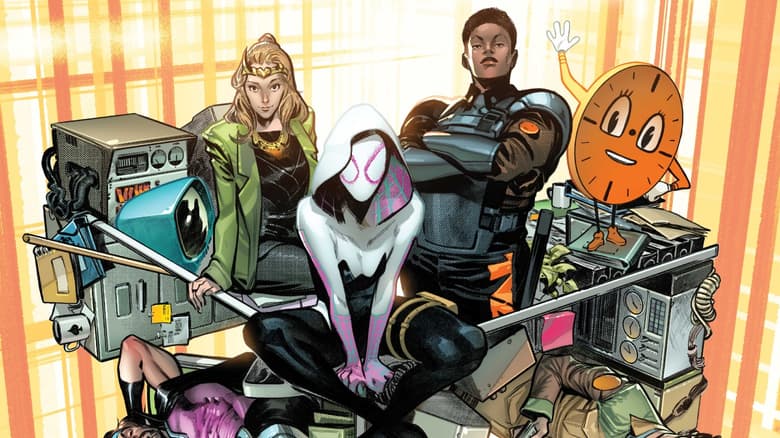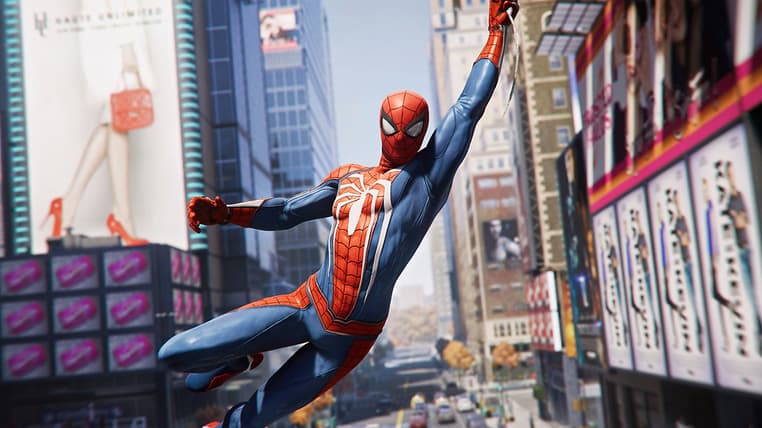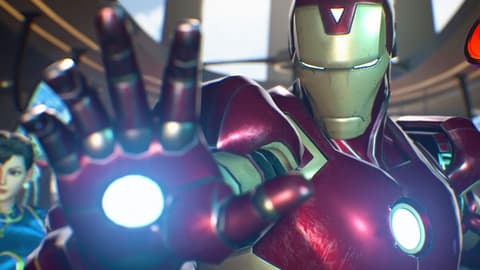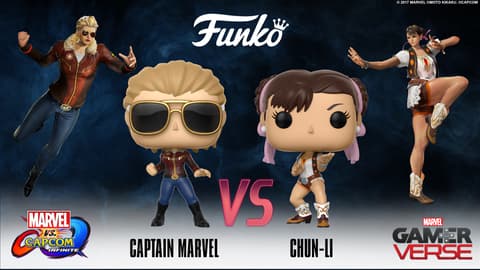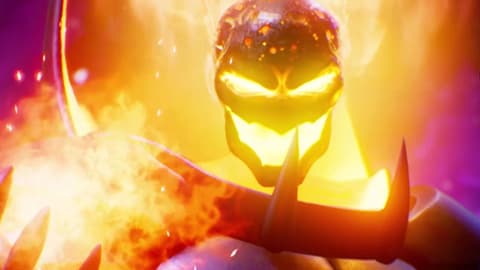Behind the Scenes of ‘Marvel vs. Capcom: Infinite’
Two creative powerhouses give us a peek behind the 'Marvel vs. Capcom' curtain.
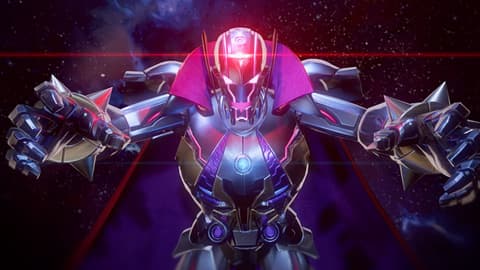
Hyped for “Marvel vs. Capcom: Infinite‘s” imminent release? Us too! So much so that we reached out to some of the awesome people who put their blood, sweat, and tears into making the game a reality. First on deck: Marvel Games Executive Creative Director Bill Rosemann and veteran games writer Paul Gardner.
Marvel.com: I know fans of the series were a little worried that “Ultimate Marvel vs. Capcom 3” might have been the final game in the franchise. How does it feel knowing “Marvel vs. Capcom: Infinite” is just a week or so from launch?
Bill Rosemann: As fans of the franchise ourselves, everyone on the Marvel Games and Capcom teams are hyped for the launch! After many months thinking about, talking about, reviewing, and refining “Marvel Vs. Capcom: Infinite,” the time has finally come to unleash it upon the world with fingers crossed that we’ve created a game that continues the series’ proud heritage and will deliver infinite hours of joy for the community we love.
Paul Gardner: It’s been a long time coming, but I love that there’s always been a long period of time between each of the MvC games – it kind of feels like a big event when they do arrive. At this point, I’m just looking forward to getting a copy, and playing the game. I’ve not yet had a chance to actually play through the full story mode, so I’m excited for that.
Marvel.com: And awesome fighting games aren’t made overnight. This must have been a long process. What were some of your favorite parts of the journey? What were some of the most challenging aspects to bringing the game to life?
Bill Rosemann: The years that the team spent pouring our blood, sweat and tears into the game were indeed a journey filled with challenges and surprises. Thinking always of Spider-Man’s motto “with great power comes great responsibility,” we took very seriously the opportunity we were granted. The pressure we placed on ourselves to create a game worthy of its heritage and title was at times intense, but it’s through pressure that diamonds are formed, and it was through this process that both teams bonded and were able to meet so many awesome fans that make up the MvC family.
Paul Gardner: I first became involved with the project around summer 2015 and finished the script in spring/summer 2016. So, as long as this process has been for me, it’s been even longer for the teams at Marvel and Capcom. But I’ve been on hand since then to help out whenever needed in whatever way I can. It’s the nature of game development that things evolve during production, so you have to stay flexible, and be adaptable. We did rewrites refining the script throughout the development process, and even during the dialogue recording sessions, in response to hearing the actors’ performances.
I think the parts I’ve enjoyed most have been the transitional moments between the different stages of the project, like first sitting with Mike and Brett from Capcom and working through the story, or writing the first passes of dialogue for each scene.
At key points during the writing and editing process, we’d all sit together and do a table-read of the script. The first time I met Bill and Mike from Marvel, we read through the first scene of the game together, with everybody reading multiple roles. That was a good moment, if a bit scary.
Later, I was invited down to Burbank for the first week of the voice recording sessions with Jonathan Kline. We spent a lot of time talking about the tone and spirit of the story, and I got a chance to hear the words in the characters’ voices for the first time.
It was cool seeing the development of the cinematics, from storyboards, to animatics to final animation, with all the extra layers of detail and characterization and performance. The cinematics have this really specific Capcom style, that feels like it couldn’t have been made by anybody else.
One big thing for me was taking part in the story panel at San Diego Comic-Con, and hearing the audience’s response live, cheering the first appearance of Frank West and Spider-Man, laughing at the jokes or whatever. I’ve never had that experience before. Usually, the only feedback you get is in comments online that appear weeks and months and years after the game is out. So, getting that immediate feedback was an incredible experience.
I suppose the challenges were all about balance, in different ways, making sure that all characters play their part in the story, that everybody gets their moment to shine, telling an epic story while keeping a sense of urgency to the scenes, balancing story and gameplay. You want the story to give meaning to the gameplay, but not overwhelm it.
Marvel.com: The “Marvel vs. Capcom” franchise has a long legacy of incredible gameplay and awesome in-game moments, but this is probably the first time the story’s seen this much TLC. Can you talk a little about what it was like designing the narrative and what it means for MvC games going forward?
Bill Rosemann: Speaking for the Marvel side, everything we do at its core is about storytelling. A clash of characters without motivations, goals and stakes is just smashing together two action figures… but when you understand what each side is fighting for and can empathize with their struggle, that’s when you get antagonists you can root for and a story you can invest in. At every point along, creating and steering the narrative, we kept asking ourselves “What do the characters want, how do these motivations translate into action, and how do these actions drive the story?” Oh, and we also asked ourselves, “What’s the coolest and most bonkers thing we can do next?”
Paul Gardner: It’s actually because MvC has a long legacy that I think the story mode is so important this time around. It works as a point of entry into the gameplay itself, another way to make the gameplay more accessible for new players. The difficulty ramps up through the story, kind of easing the player into the game, and at the same time giving a sense of real stakes and meaning to the gameplay.
My first involvement with the project was kind of unplanned. Mike Evans and I had worked together previously, and he asked me to take a look at their story outline, and perhaps provide a fresh perspective, so we met at the Capcom studio and they walked me through what they were planning. Even at that early stage, I thought they had something really cool, really creative, and very ambitious.
Most of the structure of the story, locations, stages and character roster had already been established, so when I officially joined the project as screenwriter, my first job was to help flesh out details and themes, consolidating some story threads, working through the logic and internal consistency of the story – just trying to do justice to the work they’d already done in developing the merged universe. I didn’t start the first draft of the script until all of that was worked out.
I feel like in MvC:I, we’ve done the hard work establishing the story of how the Capcom and Marvel universes collided, which leaves us free to explore all the possible avenues and threads that it’s opened up. I think the aftermath of the events that take place in this game could potentially reverberate through the shared universe for years to come.
Marvel.com: It sounds like there was a lot of collaboration between both companies. Paul this isn’t your first rodeo, but was there anything you learned or were surprised by while working on the game?
Paul Gardner: In a way it was even more complex than a collaboration between two companies, because in addition to the relationship between Marvel and Capcom USA, you also have the team developing the game at Capcom Japan. So, it’s a collaboration between three partners, and across two languages. I was really impressed by how smoothly that went. I actually got the chance to talk directly with the Japanese team while writing the script, which was great. They brought a totally different perspective to everything, and great ideas that you wouldn’t find from anywhere else. So, from that, I learned something about how important good communication is. It might seem obvious, but doesn’t always happen.
I think we all share a certain sensibility in the way we think about the relationship between story and gameplay, but I learned a lot especially from listening to Bill talk about story. He has a way of expressing complex ideas and concepts very clearly.
Marvel.com: Bill, what was it like working so closely with people who aren’t necessarily super familiar with Marvel’s 80+ years of lore?
Bill Rosemann: One of the greatest things about working on “Marvel vs. Capcom: Infinite” was the amount of knowledge and love everyone had for all the characters. I was personally blown away by both the breadth and depth of character knowledge that Paul brought to the script, which ensured that both universes would be properly represented. And sure, each of us on either side may have had our individual areas of expertise, but everyone became a student of our shared rich histories and channeled all of our collective knowledge and passion to create the next great chapter in this awesome franchise.
Paul Gardner: I was surprised by how much freedom we were given, to develop the new universe, and explore the characters. It was really liberating to be able to write for these amazing, iconic characters, knowing that Capcom and Marvel were there to give support if it was needed, and their feedback was always really thoughtful, and precise.
Another surprise was how willing both companies were to take narrative risks with their characters. For example, during a read-through of the script relatively late in the writing process, Mike and Bill at Marvel came up with this great story beat that really helped create a sense of urgency and danger within the story. I won’t say exactly what it is, but it really helps raise the stakes – if something like this can happen, then nobody is safe. And they did this with one of their most important characters.
I wasn’t sure if it was going to work out structurally, but I went back to the outline, worked it through and wrote a new draft. It really had a big impact on the story as a whole, and made me appreciate how important story is to both Marvel and Capcom. The priority wasn’t protecting their intellectual property, the priority was to tell the most compelling story possible. And it’s a reminder that there are always opportunities to make something better.
Another thing I was struck by is what huge fans Marvel and Capcom are of each other’s characters, and how everybody would push to make sure they were properly and equally represented. That was something that I thought was really embodied by Mike Jones at Marvel. He’s worked for both Capcom and Marvel, and it occurred to me that maybe he’s this super-producer who came into existence when the two universes collided. Did he exist before that? I don’t know.
Marvel.com: What are you both most proud of about the game and most excited for players to get their hands on?
Bill Rosemann: I’m a big fan of the sheer amount of imagination and wish fulfillment on display in the game. From the frenetic gameplay to the never before seen world merging to the wild character collisions to the sheer scope of the war with Ultron Sigma for the fate of two universes… Well, let’s just say that our excitement level is set on Infinite!
Paul Gardner: It’s hard to say what I’m most proud of about the game itself – I’m pleased with the way the cinematics and gameplay work together to tell the story, and there are so many moments in there that I’m really happy with. I’m proud of having been part of the development team, to have been trusted to write for these amazing characters, and in awe of the work everybody did to bring the script to life.
Obviously, for me as the screenwriter, I’m looking forward to players getting to experience the scope and scale of our story, but above all of that, I’m excited for them to discover how fun the game really is. At San Diego Comic-Con back in July, I hung out at the Capcom booth for an hour or so and just watched people playing the game. From kids button-mashing, to pro-level players, to the people who just stood watching the game, you could see everybody was having a blast. That’s something that shouldn’t be underestimated in a game, and that’s what I’m excited for players to discover.
Pre-orders for “Marvel vs. Capcom: Infinite“ are available. All editions and versions of “Marvel Vs. Capcom: Infinite” will simultaneously release next week on Tuesday, September 19. Stay tuned to Marvel.com and follow us on @marvelvscapcom and Like “Marvel vs. Capcom” on Facebook for more “Marvel vs. Capcom: Infinite” news and interviews!

